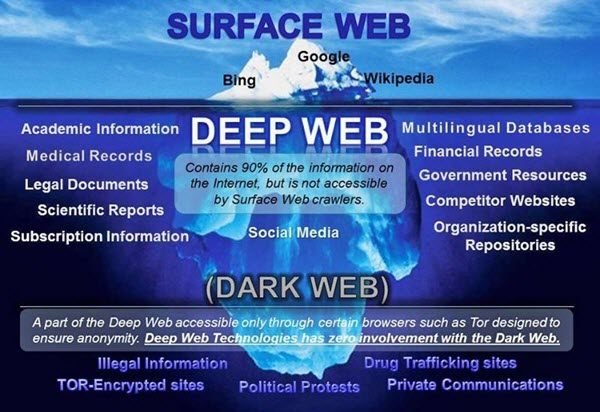Dark Web Definition
The dark web is a a section of the web that's not visible to search engines and requires the use of an anonymous browser called Tor to be accessed. It's a nexus for criminal activity, as you've probably been told. Thomas Rid and Daniel Moore, both from King's College London, analyzed the content of 273 dark web sites in the span of five weeks between 2015 and 2015. They discovered that 57% of them hosted illicit content. The University of Surrey's study for 2019, Into the Web of Profit (2019 Study) is a clear indication that the situation has gotten worse. The amount and severity of dark web listings that could damage an enterprise have grown by 20% from 2016. 60 percent of listings, with the exception of those selling drugs, are likely to cause harm to enterprises. There are many ways to buy credit card numbers, all kinds of drugs, guns counterfeit cash as well as stolen subscription credentials hacking Netflix accounts, as well as software that lets you hack into other people's computers. Purchase login credentials for an account with a value of $10,000 Bank of America account, counterfeit $20 bills, debit cards that are prepaid as well as a "lifetime" Netflix premium account. Hire hackers to hack computers. You can also purchase passwords and usernames. The dark web isn't illegal in every way however, it has an authentic side. For instance, you can join a BlackBook or Chess Club, which are social networks that have been called"the "Facebook of Tor". Check out this excellent hidden wiki advice for information.

Deep Web Vs. Dark Web: What’S The Difference?
Although the terms "deep web" or "dark web" are sometimes used interchangeably but they aren't identical. Deep web is anything that isn't found by Google search engines, and thus can't be accessed through their search engine. Anything that is behind a paywall or that requires login credentials for access to deep web content is considered to be part of. Also, it contains content that has been blocked by web crawlers. Medical records, content that is fee-based, websites for membership, and private corporate web pages are just some of the examples of the content that makes up the web's deep. Estimates put the total size of the deep web as between 96% and 99% of the web. Only a small fraction of the internet can accessible via a standard web browser, also called "clear web". The dark web is a subset of the deep web that's deliberately hidden and requires an additional browser called Tor to access the dark web, as described below. There is no way to know how big the dark web, however most estimates put it around five percent of the internet. It is important to note that not all of the dark web is used for illegal purposes even though it has a spooky name.
Dark Web Browser
You might think that it is easy to get around the dark web, with all this activity and images of a bustling marketplace. It isn’t. The internet is as chaotic and messy as you'd imagine, as everyone is anonymous and some individuals are trying to defraud others. Tor is an anonymous browser that can be used to connect to the dark web. Tor, a proxy browser, routes your requests to web pages through a number of servers operated by thousands of volunteers across the globe. This renders your IP address unavailable and is impossible to trace. Tor works like magic. However, the end result is erratic and slow. The dark web can be an excellent method to discover the darkness of human existence when you're willing to bear the discomfort.

Dark Web Search Engine
Although dark web search engines exist but even the best of them can't keep up with the constantly changing landscape. This is the same experience as when you searched the web in late 1990s. Grams is the most trusted search engine, does not return results that are not relevant or similar to the query. The Hidden Wiki has a link list, however indices return frustratingly many timed-out connections as also 404 errors.
Dark Web Websites
While dark web sites might appear the same as other website, there are significant distinctions. One of them is the structure of their names. Dark web sites do not have a domain ending in.co or.com. They end in.onion. Wikipedia defines it as "a top-level domain suffix that identifies invisible hidden services that can be accessed via the Tor network." Only users who use the correct proxy can access these sites. Others aren't. Dark web sites also utilize a scrambled naming structure that results in URLs that are usually difficult to remember. For example, a popular commerce site called Dream Market goes by the unintelligible address of "eajwlvm3z2lcca76.onion." Many dark websites are set up by scammers, who constantly move around to avoid the wrath of their victims. Even websites that have been running for more than a year may suddenly disappear when the owners decide to cash-in and leave behind the money escrow on behalf of the customers.
